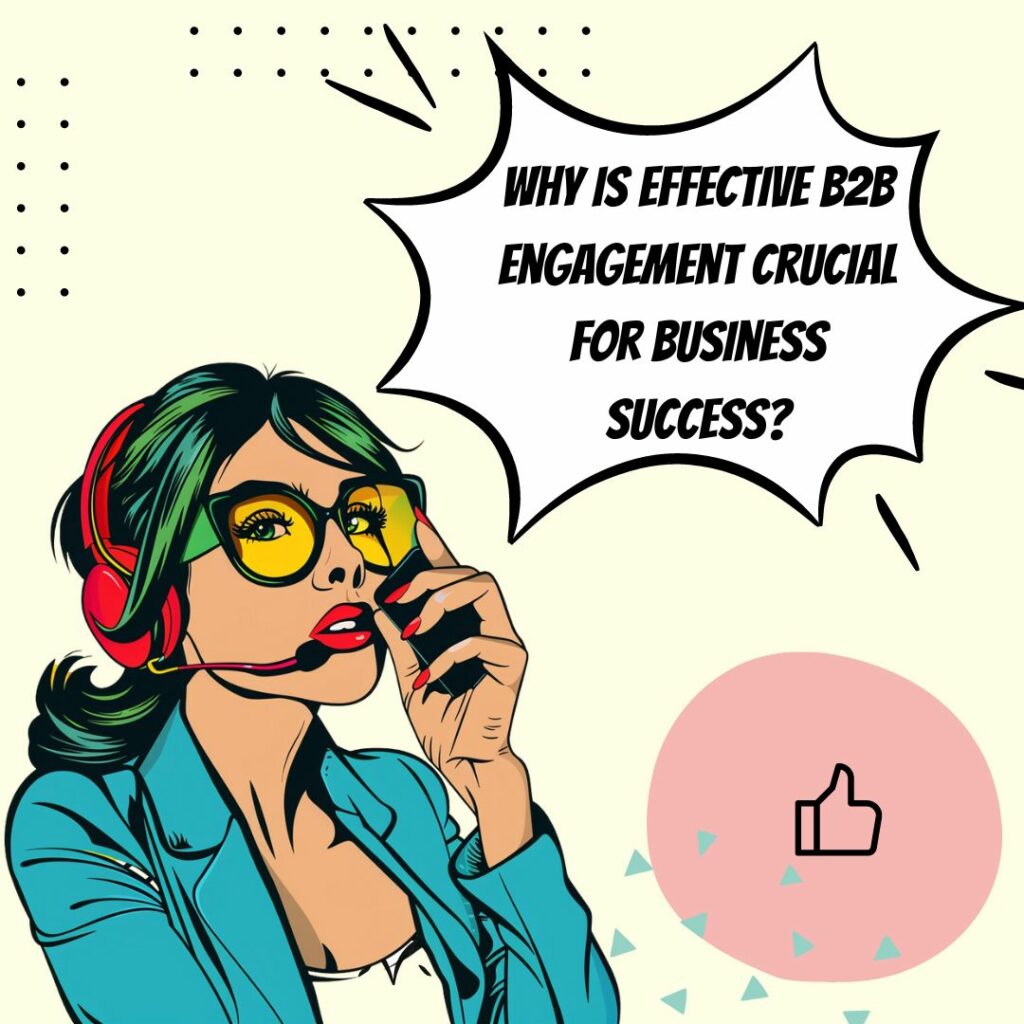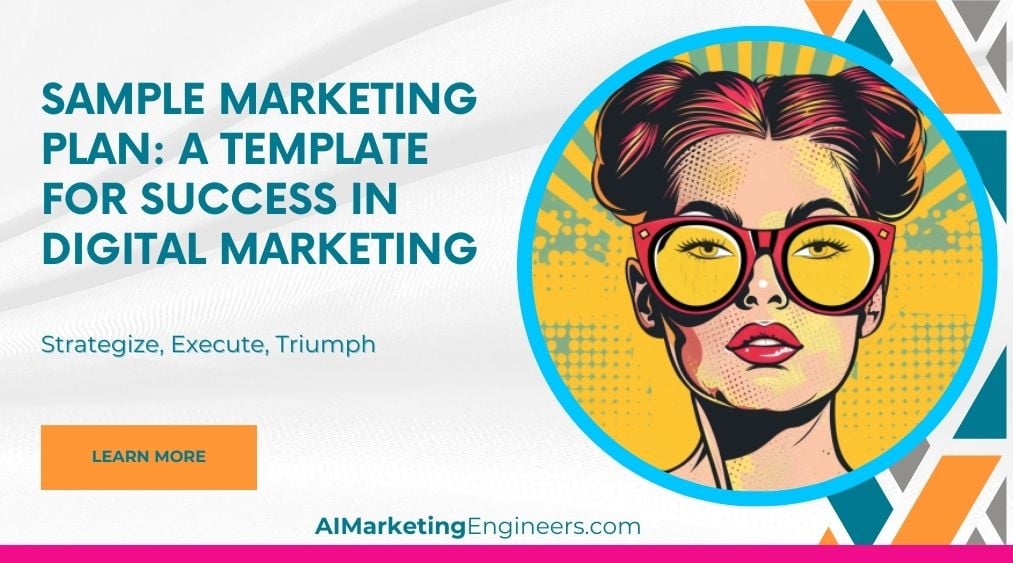Key Takeaways
✅ Understanding the Buyer Journey: Grasp the importance of navigating the layered stages of B2B interactions, with a focus on multi-stakeholder considerations and extended sales timeliness. The takeaway here is precision – tailor your approach for each unique phase of the buyer’s journey.
✅ Personalization and Relationship Building: Forge robust, lasting business relationships through hyper-personalized outreach. The key takeaway is connection – devise personalized experiences that resonate with your prospects’ core business challenges.
✅ Content Marketing and Thought Leadership: Utilize content as a tool for trust and authority-building in the B2B sector. The takeaway is expertise – deliver compelling content that not only addresses target pain points but underscores your thought leadership.

Introduction
Are you ready to catapult your enterprise to the forefront of the B2B marketplace? In the intricate dance of Business-to-Business engagement, understanding the nuances can make all the difference between a flourishing relationship and a missed opportunity. Grappling with these complexities requires a blend of strategic planning, insight-driven personalization, and a content-first approach that positions you not just as a vendor, but as an invaluable partner and thought leader.
This comprehensive breakdown of ‘B2B Marketing: Navigating the Complex World of Business-to-Business Engagement’ will walk you through every step, from deciphering the essence of B2B marketing to harnessing digital channels to turbocharge your reach. You’ll unlock modern trends, leading-edge tactics, and innovative solutions aimed at amplifying your revenue and maximizing your return on investment.
Stay tuned for actionable insights and pioneering strategies that are bound to propel your B2B engagements into new realms of success. Let’s dive deep and unravel the mastery of B2B marketing, together.
Top Statistics
| Statistics | Insight |
|---|---|
| Global B2B E-commerce Market: Valued at $6.7 trillion in 2020 with a projected CAGR of 18.7% from 2021 to 2028. (Source: Grand View Research) | This impressive growth trajectory highlights the massive potential for businesses in the B2B space to scale and capitalize on the expansion of digital marketplaces. |
| Content Marketing Investment: Nearly half of all B2B marketing spend is allocated here, with paid search advertising and events following. (Source: Content Marketing Institute & Marketing Profs) | Investing in content marketing demonstrates its fundamental role in engaging decision-makers and establishing thought leadership in B2B marketing. |
| B2B Buyer Demographics: Millennials account for 59%, while Gen Z represents 7%, marking a younger demographic shift. (Source: LinkedIn) | The shift towards younger B2B buyers illustrates the need for dynamic and tech-savvy marketing tactics to meet the expectations and behaviors of these demographic groups. |
| B2B Online Research: Over 80% of buyers perform digital research prior to purchasing decisions. (Source: Think With Google) | This underlines the importance of having a strong online presence and authoritative content that facilitates well-informed purchasing decisions. |
| Video Marketing: With 86% of businesses utilizing this medium, and 93% maintaining or boosting investments. (Source: Wyzowl) | The growing use of video reflects its effectiveness in engaging B2B audiences, but also the need for compelling storytelling and high-production values in B2B communication. |
Understanding the B2B Ecosystem
At the heart of effective B2B engagement lies a deep understanding of the various players involved. These include suppliers, customers, partners, and even influential industry figures. Each of these stakeholders has their own set of motivations, decision-making processes, and pain points that must be carefully considered.
For instance, a supplier might be primarily concerned with ensuring a steady stream of orders and on-time payments, while a customer may be focused on finding a reliable partner who can deliver quality products or services at the right price. By taking the time to truly comprehend these differing perspectives, businesses can tailor their engagement strategies to address the unique needs of each stakeholder.
Developing a Comprehensive B2B Engagement Strategy
Successful B2B engagement doesn't happen by chance – it requires a well-defined, strategic approach. This starts with establishing clear goals and objectives, whether it's expanding your customer base, strengthening existing relationships, or exploring new market opportunities.
From there, businesses must carefully consider the key elements of their engagement strategy, such as relationship building, effective communication, value proposition, and mapping the customer journey. By crafting a comprehensive plan that addresses these critical components, companies can position themselves for long-term success in the B2B arena.
Leveraging Effective Communication Channels
In the world of B2B, the art of communication is paramount. Companies must be adept at utilizing a diverse array of channels, from in-person interactions and networking events to digital platforms and content marketing.
The key is to strike the right balance and optimize the use of each channel to reach and engage B2B stakeholders effectively. For example, a personal touch through face-to-face meetings might be crucial for building trust and fostering relationships, while a well-crafted content strategy can help position your business as a thought leader and valuable resource.
Building and Nurturing Long-Term Relationships
At the heart of successful B2B engagement lies the ability to cultivate strong, lasting relationships. Unlike the more transactional nature of B2C interactions, B2B partnerships often require a deeper level of trust, collaboration, and mutual understanding.
By consistently demonstrating value, fostering open communication, and going above and beyond to address the needs of their partners and customers, businesses can build a loyal following that transcends the confines of a single transaction. These long-term relationships not only provide a steady stream of revenue but also open the door to new opportunities for growth and collaboration.
Adapting to Changing B2B Dynamics
As the business world continues to evolve, the savviest B2B engagement strategies must also adapt and evolve. Emerging trends such as the rapid digitalization of the industry, the increasing importance of data-driven insights, and the growing demand for personalized solutions are all shaping the future of B2B engagement.
By staying agile, continuously learning, and embracing new technologies and best practices, businesses can position themselves to thrive in the ever-changing landscape of B2B interactions. After all, the ability to adapt and innovate is often the key differentiator between those who merely survive and those who truly excel in the complex world of business-to-business engagement.
Inspirational Quotes
1. “In B2B marketing, you aren’t just competing for attention; you’re competing for change.” – Seth Godin
Seth Godin brilliantly captures the essence of the unique battleground that is B2B marketing. It’s about grappling with the status quo and demonstrating the value of change. To resonate and make a mark, your approach needs to delve into the very heart of your target market’s operations, unravel their routines, and effectively communicate how your solutions pave the way for transformation and growth—a fundamental shift from traditional marketing techniques that often prioritise visibility over substantive change.
2. “The most important thing is to try and innovate your product and your service, not just for the sake of marketing, but actually finding new ways to engage customers and do things better than what’s gone before.” – Richard Branson
Richard Branson, a paragon of entrepreneurial success, steers us toward the undeniable power of innovation. It’s not about reinventing for the limelight; it’s about dedication to enhancing every customer touchpoint, every service nuance. It’s about embedding the art of innovation into your brand’s DNA, thus forging pathways to engagement that command attention, invite dialogue, and cement customer allegiance. By setting this gold standard, you’re not merely raising the bar; you’re elevating your offering to an experience that resonates on a much more profound level.
3. “The future of B2B marketing lies in creating personalized experiences at scale.” – Peter Isaacson
Peter Isaacson—esteemed for his sharp marketing acumen—highlights an evolutionary leap in the realm of B2B marketing: personalization, but not just any personalization—the kind that scales. As B2B marketers, it’s time to harness big data, AI, and innovative automation tools to craft those crucial one-on-one conversations, but within the vast cosmos of your market. Personalizing at scale is the beacon leading towards a future where every client feels like the center of the business universe, deeply engaged and thoroughly understood.
AI Marketing Engineers Recommendation
Recommendation 1: Leverage Account-Based Marketing (ABM) Strategies for Enhanced Personalization: Recent data indicates that ABM can improve customer acquisition rates by up to 150%. Develop highly personalized marketing campaigns targeting specific accounts that are identified as ideal customers. Utilize AI tools for data analysis to create customer profiles and craft tailored messages for different stakeholders within the same organization. This precision approach not only nurtures prospects effectively but also aligns sales and marketing efforts for higher efficiency.
Recommendation 2: Incorporate Thought Leadership and Content Marketing: As per Demand Gen Report 2020, 96% of B2B buyers want content with more input from industry thought leaders. Position your brand as an expert by producing authoritative, insightful content that addresses the complex challenges and trends in your industry. This builds credibility and trust. Employ a multi-channel strategy to disseminate whitepapers, case studies, webinars, and blogs that speak to the specific needs of B2B decision-makers, aiding their journey from awareness to decision-making.
Recommendation 3: Utilize AI-Powered CRM Systems for Dynamic Customer Engagement: Integrate a customer relationship management system equipped with AI to collect real-time data and provide actionable insights. Tools like Salesforce Einstein or HubSpot AI enable you to analyze customer interaction patterns, predict future behaviors, and personalize the customer experience. They offer the double benefit of improving customer satisfaction and streamlining the sales process, ultimately driving revenue growth in the complex B2B landscape.
Conclusion
In this intricate dance of B2B marketing, we’ve unravelled the threads of navigating through the maze of business-to-business engagement. Understanding the distinct buyer journey in B2B contexts, we’ve peeled back the layers to reveal the importance of identifying and courting key decision-makers and influencers. As we forge forward, integrating personalized relationships and content marketing strategies that resonate with our unique audiences will be pivotal in securing our foothold in this competitive arena.
Significantly, our success hinges on the synergy between sales and marketing teams, an alliance supercharged by shared goals and seamless CRM systems. By leveraging digital channels—turning every email, social post, and targeted ad into a harmonious chord in our omnichannel strategy—we pave the way for measurable impacts and sustained growth in the B2B landscape.
Guided by these insights and armed with a trove of actionable advice, businesses are set to conquer new heights in B2B engagement. Stay attuned to emerging trends and technologies, for they are the beacons that will illuminate our journey ahead. The quest for B2B mastery is ongoing, yet within reach for those ready to embark on the path of strategic, well-orchestrated marketing moves. Let’s continue to champion innovative solutions and cultivate partnerships that propel us toward a thriving, interconnected marketplace.
FAQs
Question 1: What is B2B marketing?
Answer: B2B (business-to-business) marketing refers to the strategic efforts businesses undertake to promote their products or services to other companies rather than directly targeting individual consumers. It involves understanding complex buying processes, decision-makers, and building long-term relationships within the business ecosystem.
Question 2: How does B2B marketing differ from B2C marketing?
Answer: While both types of marketing share common goals like increasing brand awareness and driving sales, B2B marketing focuses on longer sales cycles, multiple decision-makers, and more rational purchasing decisions compared to the emotional and impulsive nature of B2C marketing.
Question 3: Who are the typical buyers in B2B markets?
Answer: In B2B markets, buyers are usually professionals representing their companies, such as procurement managers, C-suite executives, and department heads. They often make purchasing decisions based on the potential value a product or service offers to their business.
Question 4: What are the most effective B2B marketing channels?
Answer: Effective B2B marketing channels include content marketing (blog posts, whitepapers, case studies), email marketing, social media, search engine optimization (SEO), account-based marketing (ABM), and industry events like trade shows and conferences.
Question 5: How important is content marketing in B2B marketing?
Answer: Content marketing is crucial in B2B marketing as it helps establish thought leadership, build trust, and educate potential buyers about the value of your products or services. High-quality content can attract, engage, and convert prospects into customers.
Question 6: What is account-based marketing (ABM), and how does it fit into B2B marketing?
Answer: ABM is a strategic approach to B2B marketing where businesses focus on targeting and engaging specific high-value accounts. It involves personalized marketing tactics and sales outreach to key decision-makers within the targeted accounts.
Question 7: How can B2B marketers measure the success of their marketing efforts?
Answer: B2B marketers can measure the success of their marketing efforts by tracking key performance indicators (KPIs) such as website traffic, lead generation, conversion rates, customer acquisition costs, customer lifetime value, and return on investment (ROI).
Question 8: What role does social media play in B2B marketing?
Answer: Social media plays a significant role in B2B marketing by enabling businesses to build brand awareness, engage with their target audience, and share valuable content. LinkedIn, in particular, is a popular platform for B2B marketers due to its professional focus and ability to connect with decision-makers.
Question 9: How can B2B marketers improve their lead generation efforts?
Answer: B2B marketers can improve their lead generation efforts by creating high-quality content, optimizing their website for SEO, leveraging social media, using targeted advertising, and implementing lead nurturing strategies to engage and convert prospects into customers.
Question 10: What are some best practices for B2B email marketing?
Answer: Best practices for B2B email marketing include segmenting your audience, personalizing your messages, using a clear and compelling subject line, including valuable and relevant content, optimizing for mobile devices, and testing and measuring your campaigns to improve performance.
Academic References
- Gartner. (2019). The New Science of B2B Buying. Retrieved from Gartner website. This report highlights the complexities in B2B buying, involving multiple stakeholders and elaborate decision-making processes, prompting marketers to refine their strategies to cater to this intricate dynamic.
- Forrester Research. (2015). A Framework for Understanding B2B Customer Experience. Retrieved from Forrester website. Forrester’s study delivers a thorough framework to grasp and enhance the customer experience in B2B scenarios, underscoring the vitality of personalization and consistency across various customer touchpoints.
- Narver, J. C., & Slater, S. F. (1990). Market Orientation and Organizational Performance: Is Innovation a Missing Link? Journal of Marketing, 54(4), 1-18. This key article scrutinizes the link between market orientation and innovation, proposing that attentiveness to customer needs is crucial for B2B organizational performance.
- Peñafiel, C., et al. (2018). Content Marketing in B2B Environments: A Framework for Practice. Journal of Product & Brand Management, 28(5), 640-657. Peñafiel and colleagues offer a practical framework for B2B content marketing, emphasizing content creation, dissemination, and performance measurement to captivate business buyers.
- Bain & Company. (2016). The B2B Elements of Value. Retrieved from Bain & Company website. Bain & Company lays out a framework aiding B2B companies in discerning and conveying value, introducing 40 unique ‘elements of value’ to customize according to the diverse requirements of business clients.













